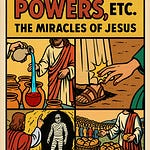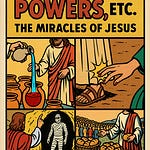Christ the King: Romans 16.20-27
When I was a student in seminary, I took a course on the New Testament taught by Dr. Donald Juel. I’d call the experience a conversion if Jesus hadn’t already hijacked my life. Dr. Juel was a tall, terribly thin professor with a Minnesota accent. One afternoon in one of the first classes, Dr. Juel read the Parable of the Prodigal Son from the Gospel of Luke.
You know the story:
The Fifth Commandment be damned, a spoiled youngest son wishes his Dad dead and guilts the old man into cashing out half his pension and giving it to the punk, who promptly burns through it on activities which would not pass muster at a Senate confirmation hearing. After the kid Venmo’s his account empty, he reasons that he could always go back home to Florida and try his hand at actual work. And no sooner does the old man recognize the boy's gait walking the horizon line than the father runs like a fool to his son. With tears streaming down his cheeks, he throws his arms around the loser. Before you know it, the kid— who’s learned no actual lesson, mind you— is better off than before he departed for the far country. Still smelling of swine, he nevertheless is wearing the father's robe and ring. And somewhere a calf, all fat for Thanksgiving, starts to curse the kid’s name.
“We have no choice but to party!” the father shouts to all who have ears.
In case you missed it, it’s all one way love.
The Father restores his sinful child without the sinful child showing an iota of repentance. The Father offers more than mercy in spite of the son’s disobedience. The Father promises grace apart from the demand of the law.
When the older brother comes back from pulling a double-shift in his brother’s absence, he hears all the happy chatting and china clinking. Curiosity turns to indignation. The Father once again condescends to make an embarrassing gesture, leaving the party to plead with his oldest boy. But the boy seethes, “All these years I have been working like a slave for you, and I have never disobeyed your command. But when this son of yours comes back, this son— who has devoured your property with prostitutes, you kill the fatted calf for him?”
The parable ends with the elder brother’s arms crossed, refusing to be party to the party.
Dr. Juel had been reading the story in a flat, prairie, matter-of-fact way. He had no affect on his face or haste about his manner. When he got to the end of the parable, he closed his Bible and he paused for moments that felt stretched to their breaking point. And then he bounced on his toes like he was about to take off into the air. He gazed at us wide-eyed, like he was about to say the most important thing of our lives.
He was.
At the top of his lungs— lungs which an immune disorder were slowly constricting unto death— Dr. Juel hollered at us in a high-pitched yawp.
“He's right! The elder brother— he's right! He's absolutely right. Every word, he's right! You don’t even need the commandments. Where does God get off?! Common sense tells you that he’s right!”
Hunched over his lectern, Dr. Juel paused a minute more, his intense eyes surveying his listeners. Finally he stood up, straightened his tie and the part in his thin hair, and then he spoke with astonishment in his voice, like he was cracking open a secret for the first time:
“Maybe now you understand why they killed Jesus. Because in
spinning such parables, Jesus asserted, offensively so, that no one
speaks for the life-giving LORD but him. Amidst all the competing
claims about God in the world, Jesus insisted that the LORD is
found nowhere— nowhere else— but in him.”
As if to prove the professor’s point, a half dozen hands shot up in the air so fast you would think he had just uttered blasphemy.
“The grace of our LORD Jesus be with you.”
Thus the apostle Paul ends his epistle with the very claim with which he began, “Grace to you and peace from…the LORD Jesus Christ.” Just as it signaled more than a greeting, Paul culminates his letter with much more than a benediction.
Indeed it could easily be reckoned as blasphemy.
There is a twist at the tail.
Paul forgoes a less contentious conclusion. He does not sign off to the churches at Rome by saying, “The grace of God be with you.” He does not bless them under the all-inclusive auspices of the Maker of Heaven and Earth. Paul affixes to Mary’s boy and Pilate’s victim the appellative for the NAME too holy to be spoken anywhere but from the Burning Bush.
Adonnai.
LORD.
God— Theos— is not a name; it is a common noun, like car or beer.
Paul does not bless them, “The grace of Theos be with you.” Paul writes, “The grace of the LORD Jesus be with you.” LORD, the appellative for YAHWEH. That is, the NAME that is above every name, the NAME that will bow every knee in creation and loose every creature’s tongue, the NAME revealed to Moses— barefoot and astonished in the wilderness— is identical with Jesus.
There is a twist at the tail.
Even though a consensus stretching back to the primal church judges verses twenty-one and forward to be a later edition to Paul’s original letter, verse twenty-seven concludes by registering the same astonishing confession, “To the only wise God, through Jesus the King, to whom be the glory forever. Amen!” Throughout his Letter to the Romans, Paul regularly moves with bewildering ease between the one God and Jesus the LORD and King. Yet this final verse closes with teasing ambiguity.
To whom belongs the divine glory?
Which person does Paul mean?
The LORD?
Or Jesus?
Yes!
There is a twist at the tail of this letter.
Earlier this year I received an email from a former parishioner who has since retired to North Carolina. When I first met him, Mike was steeped in the civil religion of his upbringing and the Christian nationalism of his military service. He sang in the choir. He served on the trustees. He led a stewardship campaign. But the God he worshipped every Sunday was simply God.
Theos.
In his email, Mike wrote:
“Jason,
I was just listening to your talk with bishop Will Willimon, critiquing the notion that words cannot capture God. Toward the end, Willimon tells of asking a Duke student whether or not he was Christian. The student objected that the question was personal— that it "crossed a boundary." And, of course, it is personal and it does indeed cross many lines of etiquette.
But Willimon nevertheless responded: "I'm a Christian; this is what we do!" Well, in my experience, not many do. And those that do, don't do it very often. But you did, back in my Aldersgate days. And you do now, I'm sure. Thanks for being that kind of Christian.
Coming across as rude and offensive doesn’t seem to be a concern that troubles you. Still, if you hadn’t taken such a risk, I might not have ever realized the God I had been worshipping was not the LORD.
God is an empty category. We can fill it with our own values, aspirations, and prejudices. And I did, even blessing war and justifying torture in his name.
The LORD Jesus, however, is a NAME that eliminates all other claimants to the throne. And because it’s a NAME, it sharpens what we can say about God.
The kid at Duke was right. This is uncomfortable stuff. If Jesus is the LORD, then talk of God that obeys the manners of a secular culture can’t help but be blasphemy.”
“The grace of our LORD Jesus be with you.”
The polemical edge on which Paul ends this epistle is in no way unique to the scriptures. The entire New Testament is written in the face of competing claims about God. For example, when Paul proclaims to the Corinthians the revelation that “the LORD was in Christ reconciling the world to himself, Paul simultaneously posits the correlative, “the LORD was reconciling the world to himself in no other way— through no other person, at no other place, in no other religion.”
For those raised in a culture where Christianity was the de facto established religion, it can be difficult to see: the New Testament is driven by controversy, and the controversy is precisely around the unique status of Jesus as the sole revelation of the true God.
The polemical edge on which Paul ends his letter is present from the very start of the Gospels.
As John announces in the Prologue to his Gospel:
“The light shines in the darkness, and the darkness did not overcome it…The law indeed was given through Moses; grace and truth came through Jesus the King. No one has ever seen God. It is only the Son, who is close to the Father’s heart, who has made the LORD known.”
Shortly thereafter in John’s Gospel, Jesus’s unprecedented claims to divine authority not only provoke charges of blasphemy they galvanize the plot to murder him, “For this reason they were seeking all the more to kill him, because he was not only breaking the sabbath, but was also calling God his own Father, thereby making himself equal to God.”
Jesus responds to their outrage by sticking his thumb in the wound, claiming that he is the life-giving LORD to whom the Father has given all power to judge.
A mere chapter later, with loaves and fish, Jesus asserts that he is the LORD’s life-giving bread and that to feed on him by faith is to do the will and work of the true and only God who spoke to Moses.
His claim elicits more controversy.
As that teacher of mine, Donal Juel writes:
“The New Testament is written to convince (or confirm) that life comes exclusively through faith in Jesus the King. That argument is made in the face of competing claims, in particular the claim that the Creator is known through the law— natural law or revealed law. For the New Testament, the claims are incompatible. God is experienced as gracious either in Jesus or elsewhere. Everything in the New Testament is written in the face of alternatives. The creeds likewise presume other contrary candidates for God. Any gospel proclamation in our own setting must take seriously other forms of theism as well as atheism.”
Even after Pontius Pilate has interrogated Jesus and had him flogged, Christ's opponents cannot abide the absolute assertions he has made about himself, which prompts their demand for his murder. “We have a law,” they say to Pilate, “and according to that law Jesus ought to die because Jesus has claimed to be [the LORD].”
“To the only wise God, through Jesus, to whom be the glory.”
To who?
One afternoon almost five years ago, a young woman wandered into the church. The hijab wrapped loosely around her head was as brightly colored as her MacBook was covered in stickers.
“I'm looking for a preacher,” she said.
I’d been standing in the atrium, and I greeted her as the pastor.
She introduced herself as a student at George Mason University.
“I'm enrolled in a comparative religions class,” she explained, “As part of our final paper, we're supposed to interview religious leaders about how their communities worship and why.”
Her name was Adila.
I showed her around the sanctuary. I told her how the first Christians built their sanctuaries in the shape of a cross and oriented them to face east, the direction of the rising sun. I showed her my alb, and I added how in John Wesley's day, preachers would wear a white surplus over top the black robe, like our acolytes do, as a visual reminder of baptism clothing us in Christ's righteousness. I showed her the lectern and the pulpit.
“How do you decide what passage to read?” she asked me, “How do you decide what to preach?
“Well,” I said, “for instance, this coming Sunday, it's the Parable of the Prodigal Son from Luke's Gospel.”
And I saw her sounding out the word prodigal on her lips like she'd never heard it before. And so I summarized the story Jesus tells about the father who’s meant to be a stand-in for himself, the LORD.
"What happens when he comes home?” Adila asked with an interest that, to be honest, I am unaccustomed.
“As soon as he reappears from the far country, his father runs out to embrace him,” I said.
“And then what happens?” Adila asked, her voice on the edge of her seat.
So I narrated a bit more of the LORD’s story.
“But wait,” Adela said, “Hold up, didn't his son apologize? Make amends? Do something to restore his father's honor?”
“No,” I replied, “No, the father forgives him without an ounce of repenting."
“But surely his father punishes him in some way?”
“No.”
“All right, but tell me he pays back the inheritance he squandered?”
“Nope.”
She looked at me with something shy of contempt.
“Well, he does at least learn his lesson, right? Change, become a different, better person?
“Jesus never says,” I told her, “Besides, to add that detail would sort of undo the whole story.”
“I think he should have at least mentioned it,” she said, shaking her head, “I don’t understand why Jesus would tell such a terrible story.”
“He tells the story in order to say, “God the Father is like that father.””
“Well, I think Jesus was wrong. How did he know God is like that? He was just a man— a prophet maybe, but still just a human.”
I smiled
“No,” I said, “That man is God— the LORD.”
She frowned, quickly recovered, and smiled politely, like I had just uttered nonsense and decorum compelled her to humor me.
“The grace of our LORD Jesus be with you.”
The entire New Testament refers to God as Creator only eight times. The New Testament refers to God as Maker of Heaven and Earth a mere six times—fourteen total, and in many of these instances, the creative agent is the Son or the Spirit. By contrast, the New Testament refers to God as Father (of Jesus the LORD) two hundred and sixty-one times.
The numbers literally tell the story.
We put all the emphasis on believing in God or following God, but the scriptures— Old and New— are instead most concerned with identifying God, the true God.
In the ancient world, much like today, it was in vogue to honor the divine by heaping a plethora of names upon deity. All names, the ancients supposed, were ultimately equivalent names. But the Bible makes the opposite move. There is a NAME that is above every name, and identifying that NAME is the Bible’s central plot.
The proper NAME of the only true God is what the Bible reveals.
If you go to the scriptures searching for answers to a great many of the questions that vex us, you will not often find a clear or singular response.
How does Jesus save us? The scriptures offer multiple motifs.
Which is more redemptive, cross or resurrection? It depends on whose Gospel you read.
Is divorce prohibited or permitted? The Bible’s answer is uneven.
Can women teach in the church? There are as many positions as churches planted by Paul.
Did Christ die on Passover or the day before? Even on this key item, John does not agree with Matthew, Mark, and Luke.
Some view the Bible’s conflicting commands, inconsistent details, and irreconcilable propositions and they despair that the scriptures lack all clarity. But if the question you ask instead is “Which god is God— and what is he like?” then there are no other answers than “the LORD Jesus.”
The twist at the tail of Paul’s letter is, in fact, the spinal cord of the scriptures. The way the whole Bible hangs together is as a single, coherent narrative that discloses the proper name of God.
And the fact that we can name this NAME— that we know who God is— it is exactly what Paul calls it.
Grace: a sheer gift.
As the theologian Robert Jenson says, The new thing that is the content of the gospel is that the true God, out of all other putative candidates, now can be known in the LORD Jesus.
After Adila recovered from her frown, to notion that the LORD could have both a mother and an executioner she said to me, “That’s why I could never be a Christian.”
And then she walked away.
I mentioned Adila in a sermon three years ago; upon which, a listener recoiled and pushed back, “Does that mean that young woman and people of other faiths will not be saved?”
“Of course it doesn’t mean that,” I replied, “It means that to the extent that she or anyone else is saved, it’s the LORD Jesus who will save them.”
“I don’t think they’d like that answer,” the listener replied.
“No one ever has.”
Except I was wrong.
After service, on one of the last Sundays he was able to attend worship before he died, I spoke with Mike Moser over coffee. Mike’s relationship with his son was not all that different from my own relationship with my father. And so Mike did not need to say more to me than he did.
“You know, Jason. It’s not always the son. Sometimes it’s the father who gets lost in the far country.”
I looked at him and nodded.
That’s all the response Mike needed from me to know I understood.
“I suppose that’s what made me a useful sponsor for AA.”
He took a sip from his coffee and took a longer pause. Finally he said, “But I have so many regrets from my sojourn in the far country.”
I put my hand on Mike’s shoulder so he’d look away from his mug and into my eyes.
“All of that— all of it— is already forgiven,” I said to him.
He narrowed his eyes and frowned every so slightly, “I cherish the thought, Jason, but how do you know?”
“I know,” I said, “because I know who the LORD is and therefore I know exactly what he’s like. So trust me when I tell you, you are forgiven.”
When I realized that it was one of the last things I ever said to Mike at the tail end of his life, I remembered all over again Professor Donald Juel, with the urgency of a drowning man, impressing upon us the claim in Jesus’s NAME.
Commonly, it’s called the Parable of the Prodigal Son.
Yet prodigal means extravagant, and it’s the father who lavishes grace upon his youngest son and is ready to do the same for his eldest. So really, the parable Jesus tells is about all three. It’s about a father’s family.
It’s about the Father’s family.
And unlike the son who comes back from the far country but for whatever reason does not go out from the party to fetch his brother, you are sent out— armed with no power or persuasion other than this NAME— to add partygoers to the Father’s feast.
It can seem a rude invitation to extend.
Therefore—
It’s no wonder the closing line to Paul’s letter is not simply a benediction.
It’s a blessing, a bestowal, a giving over of what it says.
Just so:
May the grace of the Lord Jesus be yours. If you’re going to put this NAME above every name, you’re going to need it.
So come to the table.













